We have prepared a reading list of decolonial and Palestine related literature that are available at IHRC Bookshop. Please scroll down to have a look. For more books, click here.
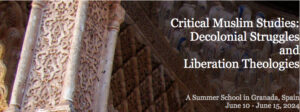 Applications for Summer School in Granada are now open!
Applications for Summer School in Granada are now open!
The Center of Study and Investigation for Decolonial Dialogues organise a summer school programme on Critical Muslim Studies: Decolonial Struggles and Liberation Theologies.
Critical Muslim Studies is inspired by a need for opening up a space for intellectually rigorous and socially committed explorations between decolonial thinking and studies of Muslims, Islam and the Islamicate. Critical Muslim Studies does not take Islam as only a spiritual tradition, or a civilization, but also as a possibility of a decolonial epistemic perspective that suggests contributions and responses to the problems facing humankind today. It offers an opportunity to interpret and understand Muslim phenomena in ways that does not reproduce Eurocentrism, Islamophobia or takfiri exclusivism.
Given that the Covid-19 crisis is under control, we will be returning to in-person instruction. This program includes intensive courses led by various speakers including UC Berkeley’s Professor Ramón Grosfoguel and IHRC’s Arzu Merali. The program also includes guided tours to the Alhambra, the Cordoba Mosque, and surrounding areas related to Al-Andalus. To apply, click here.
WATCH: Author Evening with Sandew Hira: Decolonizing The Mind – A Guide to Decolonial Theory and Practice
Two weeks ago, IHRC hosted Sandew Hira for an author evening where he discussed his publication Decolonizing the Mind: A Guide to Decolonial Theory and Practice. Click below to watch the recording of the event.
Sandew Hira, pen name of Dew Baboeram, is secretary of the Decolonial International Network Foundation (DIN). Hira studied economics at the Erasmus University Rotterdam in Holland. He has written 25 books on different topics among them colonial history.
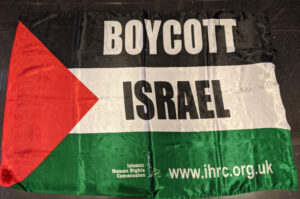 Palestine Flags are available for purchase. Click on the following below to purchase the flags:
Palestine Flags are available for purchase. Click on the following below to purchase the flags:
Palestine Flag
Palestine Car Flag
Below are books currently available at IHRC Bookshop:
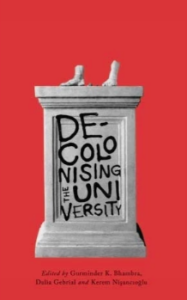 Decolonising the University – eds. Gurminder K. Bhamrah, Dalia Gebrial and Kerem Nisancioglu
Decolonising the University – eds. Gurminder K. Bhamrah, Dalia Gebrial and Kerem Nisancioglu
In 2015, students at the University of Cape Town demanded the removal of a statue of Cecil Rhodes, the imperialist, racist business magnate, from their campus. The battle cry ‘#RhodesMustFall’ sparked an international movement calling for the decolonisation of the world’s universities. Today, as this movement grows, how will it radically transform the terms upon which universities exist?
In this book, students, activists and scholars discuss the possibilities and the pitfalls of doing decolonial work in the home of the coloniser, in the heart of the establishment. Subverting curricula, enforcing diversity, and destroying old boundaries, this is a radical call for a new era of education. Offering resources for students and academics to challenge and resist coloniality inside and outside the classroom, Decolonising the University provides the tools for radical pedagogical, disciplinary and institutional change.
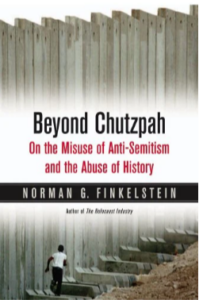 Beyond Chutzpah: On the Misuse of Anti-Semitism and the Abuse of History – Norman G. Finkelstein
Beyond Chutzpah: On the Misuse of Anti-Semitism and the Abuse of History – Norman G. Finkelstein
The sequel to Norman Finkelstein’s bestselling “The Holocaust Industry” – Finkelstein lays into the human rights record of Israel and attacks Alan Dershowitz for poor scholarship. In “Beyond Chutzpah”, Norman Finkelstein moves from an iconoclastic interrogation of the new anti-Semitism to a meticulously researched expose of the corruption of scholarship on the Israel-Palestine conflict.
Pointing to a consensus among historians and human rights organizations on the factual record, Finkelstein argues that so much controversy continues to swirl around the conflict because apologists for Israel contrive it. Examining the spread of distortions masquerading as history, Finkelstein scrutinizes the most recent addition to this genre, Alan Dershowitz’s “The Case for Israel” and, setting Dershowitz’s assertions on Israel’s human rights record against the findings of the mainstream human rights community, finds that Dershowitz has systematically misrepresented the facts. Thoroughly researched and tightly argued, “Beyond Chutzpah” lifts the veil of contrived controversy shrouding the Israel-Palestine conflict, enabling readers in search of a just and lasting peace to act on the basis of truth.
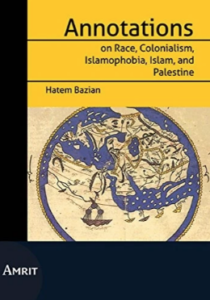 Annotations on Race, Colonialism, Islamophobia, Islam, and Palestine – Hatem Bazian
Annotations on Race, Colonialism, Islamophobia, Islam, and Palestine – Hatem Bazian
This book is a wide-ranging examination of many of the issues connected to what Dr. Martin Luther King, Jr. described as the evil triplets racism, Militarism and poverty. Dr. Bazian engages in a masterful study of these themes in both an American and international context focusing on the underlying structures facilitating their existence and entrenchment.
This work is essential reading for anyone seeking to move beyond the headlines and to understand the Underlying realities shaping some of the most pertinent and vexing issues of our day.
A powerful graphic novel, capturing the heart of day-to-day life in occupied Palestine. In late 1991 and early 1992, at the time of the first Intifada, Joe Sacco spent two months with the Palestinians in the West Bank and Gaza Strip, travelling and taking notes. Upon returning to the United States he started writing and drawing Palestine, which combines the techniques of eyewitness reportage with the medium of comic-book storytelling to explore this complex, emotionally weighty situation. He captures the heart of the Palestinian experience in image after unforgettable image, with great insight and remarkable humour.
The nine-issue comics series won a 1996 American Book Award. It is now published for the first time in one volume, befitting its status as one of the great classics of graphic non-fiction.
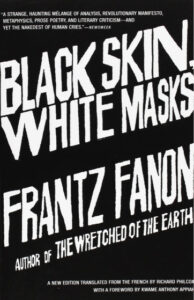 Black Skin, White Masks – Frantz Fanon
Black Skin, White Masks – Frantz Fanon
Frantz Fanon’s urgent, dynamic critique of the effects of racism on the psyche is a landmark study of the black experience in a white world.
Drawing on his own life and his work as a psychoanalyst to explore how colonialism’s subjects internalize its prejudices, eventually emulating the ‘white masks’ of their oppressors, it established Fanon as a revolutionary anti-colonialist thinker.
Other books related to Frantz Fanon:
Frantz Fanon, Postcolonialism and the Ethics of Difference
Fanon, Education, Action: Child as Method – Erica Burman
Whither Fanon?: Studies in the Blackness of Being – David Marriott
Frantz Fanon (Routledge Critical Thinkers) – Pramod K. Nayar
What Fanon Said: A Philosophical Introduction to His Life and Thought – Lewis R. Gordon
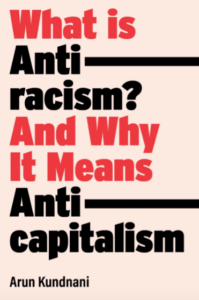 What Is Antiracism?: And Why It Means Anticapitalism – Arun Kundani
What Is Antiracism?: And Why It Means Anticapitalism – Arun Kundani
Liberals have been arguing for nearly a century that racism is fundamentally an individual problem of extremist beliefs. Responding to Nazism, thinkers like gay rights pioneer Magnus Hirschfeld and anthropologist Ruth Benedict called for teaching people, especially poor people, to be less prejudiced. Here lies the origin of today’s liberal antiracism, from diversity training to Hollywood activism.
Meanwhile, a more radical antiracism flowered in the Third World. Anticolonial revolutionaries traced racism to the broad economic and political structures of modernity. Thinkers like C.L.R. James, Claudia Jones, and Frantz Fanon showed how racism was connected to colonialism and capitalism, a perspective adopted even by Martin Luther King. Today, liberal antiracism has proven powerless against structural oppression. As Arun Kundnani demonstrates, white liberals can heroically confront their own whiteness all they want, yet these structures remain. This deeply researched and swift-moving narrative history tells the story of the two antiracism’s and their fates. As neoliberalism reordered the world in the last decades of the twentieth century, the case became clear: fighting racism means striking at its capitalist roots.
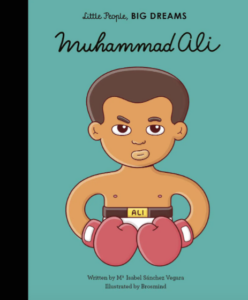 Little People, Big Dreams: Muhammad Ali – Maria Isabel Sanchez Vegara
Little People, Big Dreams: Muhammad Ali – Maria Isabel Sanchez Vegara
When he was little, Muhammad Ali had his bicycle stolen. He wanted to fight the thief, but a policeman told him him to learn how to box first. After training hard in the gym, Muhammad developed a strong jab and an even stronger work ethic. His smart thinking and talking earned him the greatest title in boxing: Heavyweight Champion of the World.
This moving book features stylish and quirky illustrations and extra facts at the back, including a biographical timeline with historical photos and a detailed profile of ‘The Greatest’s‘ life.
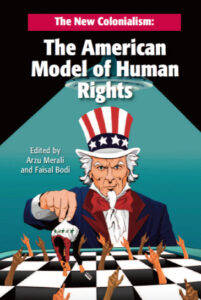 The New Colonialism: The American Model of Human Rights – Eds. Arzu Merali and Faisal Bodi
The New Colonialism: The American Model of Human Rights – Eds. Arzu Merali and Faisal Bodi
Based on IHRC’s conference of the same name, this book presents nine contributions from scholar-activists looking at how human rights as theory and practice have been co-opted by the US as part of a brutal, racist and colonial foreign and domestic policy. This book is a must-read for anyone concerned not just with US double standards but also the adulteration of the ideals of human rights as transformative discourse.
With papers from Saied R. Ameli, Laurens de Rooij, Mary K. Ryan, Saeed A. Khan, Tasneem Chopra, Sandew Hira, Ramon Grosfoguel, Rajeesh Kumar and Sohail Daulatzai.

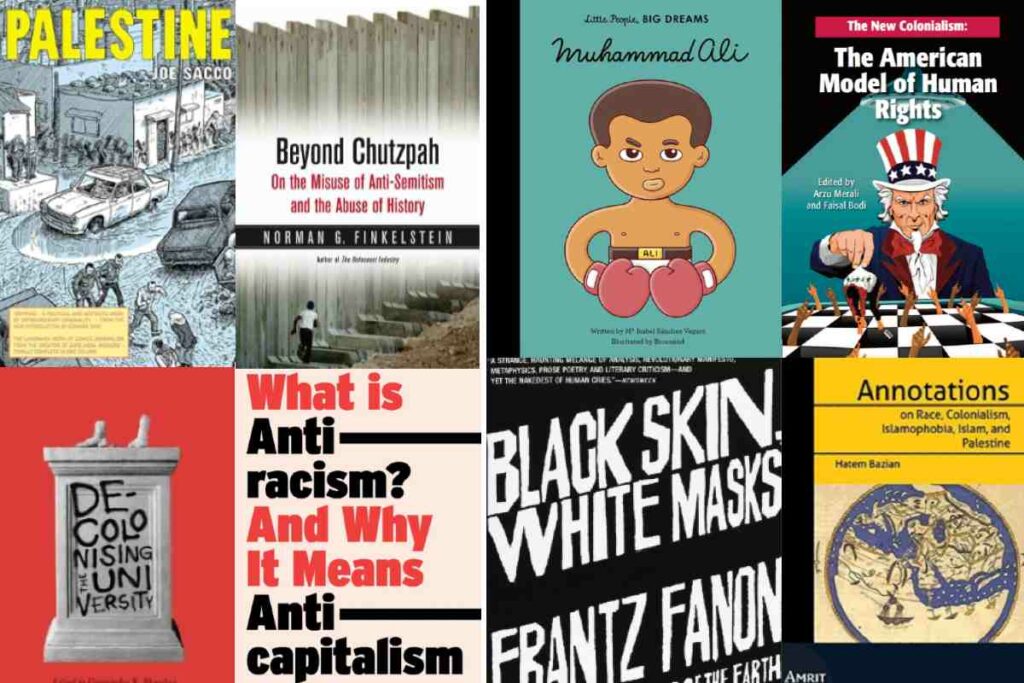
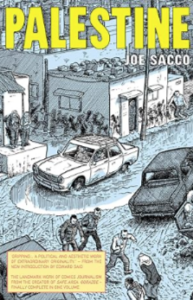 Palestine – Joe Sacco
Palestine – Joe Sacco




